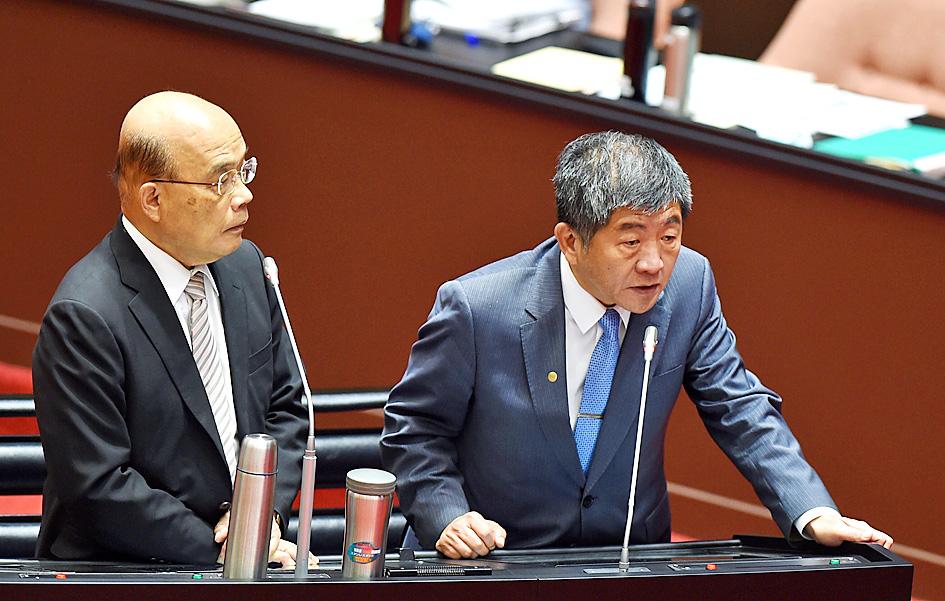Premier Su Tseng-chang (蘇貞昌) yesterday urged legislators to swiftly approve an additional NT$210 billion (US$7.17 billion) to maintain government subsidy programs keeping companies afloat during the COVID-19 pandemic.
It is the second increase of special funding for the Special Act on COVID-19 Prevention, Relief and Recovery (嚴重特殊傳染性肺炎防治及紓困振興特別條例), with the first, valued at NT$150 billion, approved on May 9.
Answering legislators’ questions at the Legislative Yuan, Su said that NT$38.3 billion would go toward pandemic prevention, specifically the purchase and research and development (R&D) of vaccines targeting the SARS-CoV-2 strain.

Photo: Liu Hsin-de, Taipei Times
It would also cover compensation for pandemic prevention efforts, purchasing drugs and other goods used for prevention, stepping up border patrols, maintaining quarantine facilities and compensating local governments, he said.
The remaining NT$171 billion would be used to maintain the Triple Stimulus Voucher program, promote loans and financing measures for small and medium-sized businesses, fund commercial-use electricity subsidies, extend subsidies for employees at companies or in industries heavily affected by the pandemic, fund subsidies to keep businesses afloat and continue R&D programs, Su said.
More than 13.3 million Taiwanese have benefited from the act’s original NT$60 billion in funding and the first special budget increase, Su said, adding that 110,000 companies have been kept afloat and 900,000 employees retained.
To date, 22.65 million people have picked up vouchers, demonstrating the program’s success, he added.
The government has allocated NT$161.1 billion from the NT$210 billion in funding already approved by the legislature, but has only spent NT$151.9 billion, or 94 percent, of the budgeted funding, Su said, adding that the government has only spent the funding where needed.
Directorate-General of Budget, Accounting and Statistics Minister Chu Tzer-ming (朱澤民) said that the Ministry of Economic Affairs would take the lion’s share, NT$137.54 billion, of the newly requested funds, followed by the Ministry of Health and Welfare, with NT$37.36 billion.
The Council of Agriculture is requesting NT$19.11 billion, while the Ministry of Labor is asking for NT$4.79 billion, Chu said.
The National Communications Commission is asking for NT$271.4 million, while the Ministry of the Interior and the Ministry of Education are requesting NT$638.55 million and NT$640 million respectively, he said.
Separating funding by category, NT$166.4 billion would be used for economic development and NT$43.58 billion for social welfare, Chu said, adding that the additional funding would be provided by raising debt.
In related news, Taiwan can obtain vaccines through self-development, international purchases or international collaboration, Su said, adding that regardless of the method, Taiwan would prioritize domestic needs.
Minister of Health and Welfare Chen Shih-chung (陳時中) said the government on Friday last week signed a contract with the Vaccine Global Access Facility (COVAX) platform, and would pay a deposit for vaccines next month. He did not specify the amount of the deposit.
COVAX is a global initiative led by the WHO, the Coalition for Epidemic Preparedness Innovations and Gavi, the Vaccine Alliance, to accelerate the development and manufacture of COVID-19 vaccines, and to guarantee fair and equitable access for every country.
Additional reporting by Chen Yun and CNA

CHAOS: Iranians took to the streets playing celebratory music after reports of Khamenei’s death on Saturday, while mourners also gathered in Tehran yesterday Iranian Supreme Leader Ayatollah Ali Khamenei was killed in a major attack on Iran launched by Israel and the US, throwing the future of the Islamic republic into doubt and raising the risk of regional instability. Iranian state television and the state-run IRNA news agency announced the 86-year-old’s death early yesterday. US President Donald Trump said it gave Iranians their “greatest chance” to “take back” their country. The announcements came after a joint US and Israeli aerial bombardment that targeted Iranian military and governmental sites. Trump said the “heavy and pinpoint bombing” would continue through the week or as long

TRUST: The KMT said it respected the US’ timing and considerations, and hoped it would continue to honor its commitments to helping Taiwan bolster its defenses and deterrence US President Donald Trump is delaying a multibillion-dollar arms sale to Taiwan to ensure his visit to Beijing is successful, a New York Times report said. The weapons sales package has stalled in the US Department of State, the report said, citing US officials it did not identify. The White House has told agencies not to push forward ahead of Trump’s meeting with Chinese President Xi Jinping (習近平), it said. The two last month held a phone call to discuss trade and geopolitical flashpoints ahead of the summit. Xi raised the Taiwan issue and urged the US to handle arms sales to

BIG SPENDERS: Foreign investors bought the most Taiwan equities since 2005, signaling confidence that an AI boom would continue to benefit chipmakers Taiwan Semiconductor Manufacturing Co’s (TSMC, 台積電) market capitalization swelled to US$2 trillion for the first time following a 4.25 percent rally in its American depositary receipts (ADR) overnight, putting the world’s biggest contract chipmaker sixth on the list of the world’s biggest companies by market capitalization, just behind Amazon.com Inc. The site CompaniesMarketcap.com ranked TSMC ahead of Saudi Aramco and Meta Platforms Inc. The Taiwanese company’s ADRs on Tuesday surged to US$385.75 on the New York Stock Exchange, as strong demand for artificial intelligence (AI) applications led to chip supply constraints and boost revenue growth to record-breaking levels. Each TSMC ADR represents

Pro-democracy media tycoon Jimmy Lai’s (黎智英) fraud conviction and prison sentence were yesterday overturned by a Hong Kong court, in a surprise legal decision that comes soon after Lai was jailed for 20 years on a separate national security charge. Judges Jeremy Poon (潘兆初), Anthea Pang (彭寶琴) and Derek Pang (彭偉昌) said in the judgement that they allowed the appeal from Lai, and another defendant in the case, to proceed, as a lower court judge had “erred.” “The Court of Appeal gave them leave to appeal against their conviction, allowed their appeals, quashed the convictions and set aside the sentences,” the judges